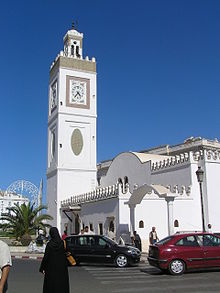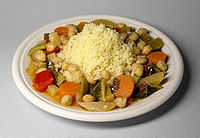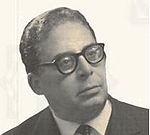- Culture of Algeria
-
The culture of Algeria encompasses the development of literature, music, religion and cuisine.
Contents
Literature
Main article: Literature of AlgeriaModern Algerian literature, split between Arabic and French,and has been strongly influenced by the country's recent history. Known poets in modern Algeria are Mufdi Zakaria, Mohammed al Aid in middle of the twentieth century, and Achour Fenni and Azrag Omar in the late eighties. Famous novelists of the twentieth century include Mohammed Dib, Albert Camus, Kateb Yacine, Ahlam Mosteghanemi, while Assia Djebar is widely translated. Among the important novelists of the 1980s were Rachid Mimouni, later vice-president of Amnesty International, and Tahar Djaout, murdered by an Islamist group in 1993 for his secularist views.[1] In philosophy and the humanities, Jacques Derrida, the father of deconstruction, was born in El Biar in Algiers; Malek Bennabi and Frantz Fanon are noted for their thoughts on decolonization; Augustine of Hippo was born in Tagaste (modern-day Souk Ahras); and Ibn Khaldun, though born in Tunis, wrote the Muqaddima while staying in Algeria. Algerian culture has been strongly influenced by Islam, the main religion. The works of the Sanusi family in pre-colonial times, and of Emir Abdelkader and Sheikh Ben Badis in colonial times, are widely noted. The Latin author Apuleius was born in Madaurus (Mdaourouch), in what later became Algeria.
Music
Main article: Music of AlgeriaThe Algerian musical genre best known abroad is raï, a pop-flavored, opinionated take on folk music, featuring international stars such as Khaled and Cheb Mami. In Algeria itself, raï remains the most popular,but the older generation still prefer shaabi, as performed by for instance Dahmane El Harrachi. while the tuneful melodies of Kabyle music, exemplified by Idir, Ait Menguellet, or Lounès Matoub, have a wide audience. For more classical tastes, Andalusi music, brought from Al-Andalus by Morisco refugees, is preserved in many older coastal towns. For a more modern style, the English born and of Algerian descent, Potent C is gradually becoming a success for younger generations. Encompassing a mixture of folk, raï, and British hip hop it is a highly collective and universal genre.
Although "“raï". http://algeria-raï.com/. is welcomed and praised as a glowing cultural emblem for Algeria, there was time when raï’s come across critical cultural and political conflictions with Islamic and government policies and practices, post-independency. Thus the distribution and expression of raï music became very difficult. However, “then the government abruptly reversed its position in mid-1985. In part this was due to the lobbying of a former liberation army officer turned pop music impresario, Colonel Snoussi, who hoped to profit from raï if it could be mainstreamed.”[2] In addition, given both nations’ relations, Algerian government was pleased with the music’s growing popularity in France. Although the music is more widely accepted on the political level, it still faces severe conflictions with the populace of Islamic faith in Algeria.
Visual arts
In painting, Mohammed Khadda[3] and M'hamed Issiakhem have been notable in recent years.
Cinema
Main article: Cinema of AlgeriaSee also: List of Algerian filmsReligion
 Mosque in Algiers.
Mosque in Algiers.
Algeria is a Muslim country, with Christian and Jewish minorities.
Main article: Religion in AlgeriaSports
See also: Football in Algeria and Rugby union in AlgeriaCuisine
 (Couscous - كسكس) with vegetables and chickpeas, the national dish of Algeria.
(Couscous - كسكس) with vegetables and chickpeas, the national dish of Algeria.
Algerian cuisine features cooking styles and dishes derived from traditional Arab, Amazigh, Turkish, and French cuisines. Additional influences of Jewish, Spanish, Berber and Italian cuisines are also found.[4] The cuisine is flavorful, often featuring a blend of traditional Mediterranean spices and chili peppers.[4] Couscous is a staple of the diet, often served with stews and other fare.
See also
References
- ^ Tahar Djaout French Publishers' Agency and France Edition, Inc. (accessed 4 April 2006)
- ^ Gross, Joan, David McMurray, and Ted Swedenburg. "Arab Noise and Ramadan Nights: Raï, Rap, and Franco-Maghrebi Identities." Diaspora 3:1 (1994): 3- 39. [Reprinted in The Anthropology of Globalization: A Reader, ed. by Jonathan Xavier and Renato Rosaldo.
- ^ Mohammed Khadda official site (accessed 4 April 2006)
- ^ a b Farid Zadi. "Algerian cuisine". http://www.chefzadi.com/2007/10/algerian-soul-f.html. Retrieved 2008-12-12.
External links
Culture of Algeria Cinema Cuisine Literature Media Music Religion Sport Symbols See also  Algeria topics
Algeria topicsPolitics and government Constitution · Council of the Nation · DRS · Elections · Flag · Foreign relations · Human rights · LGBT rights · Law enforcement · Military · People's National Assembly · Political parties · President · Prime Minister · CabinetHistory Geography and environment Economy and infrastructure Bank of Algeria · Communication · Companies · Dinar · Mineral industry · Taxation · Tourism · Trade unions · TransportCulture and society List of Algeria-related articles · Portal:Algeria Culture of Africa Sovereign
states- Algeria
- Angola
- Benin
- Botswana
- Burkina Faso
- Burundi
- Cameroon
- Cape Verde
- Central African Republic
- Chad
- Comoros
- Democratic Republic of the Congo
- Republic of the Congo
- Côte d'Ivoire (Ivory Coast)
- Djibouti
- Egypt
- Equatorial Guinea
- Eritrea
- Ethiopia
- Gabon
- The Gambia
- Ghana
- Guinea
- Guinea-Bissau
- Kenya
- Lesotho
- Liberia
- Libya
- Madagascar
- Malawi
- Mali
- Mauritania
- Mauritius
- Morocco
- Mozambique
- Namibia
- Niger
- Nigeria
- Rwanda
- São Tomé and Príncipe
- Senegal
- Seychelles
- Sierra Leone
- Somalia
- South Africa
- South Sudan
- Sudan
- Swaziland
- Tanzania
- Togo
- Tunisia
- Uganda
- Zambia
- Zimbabwe
States with limited
recognition- Sahrawi Arab Democratic Republic
- Somaliland
Dependencies and
other territories- Canary Islands / Ceuta / Melilla / Plazas de soberanía (Spain)
- Madeira (Portugal)
- Mayotte / Réunion (France)
- Saint Helena / Ascension Island / Tristan da Cunha (United Kingdom)
- Western Sahara
Categories:- Algerian culture
- Berber culture
Wikimedia Foundation. 2010.

